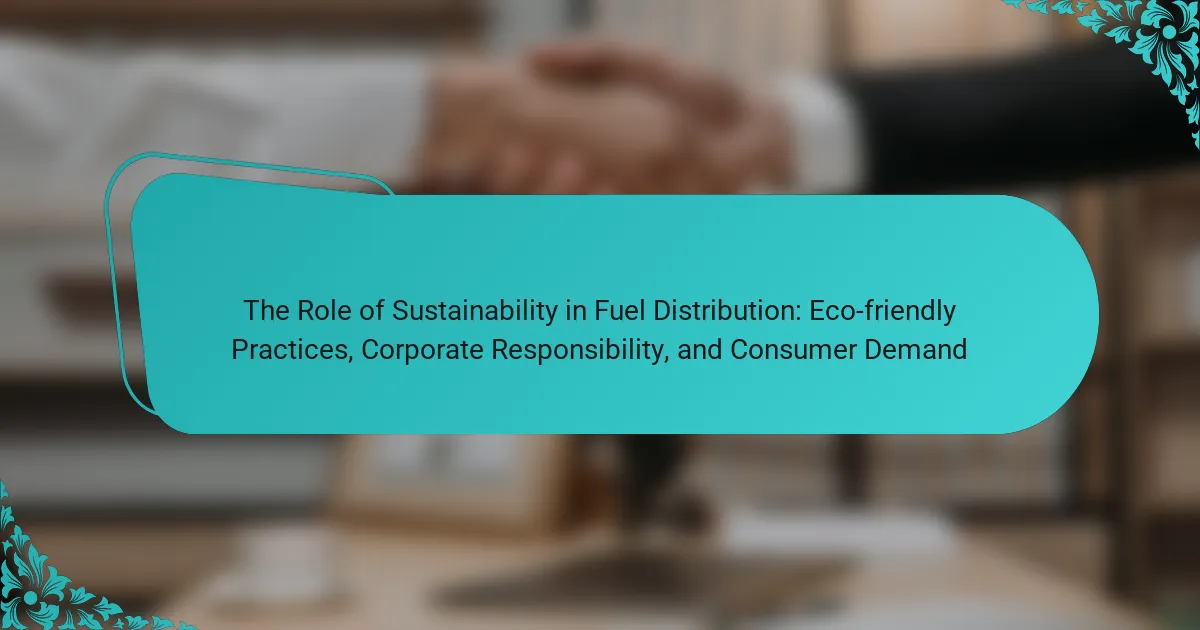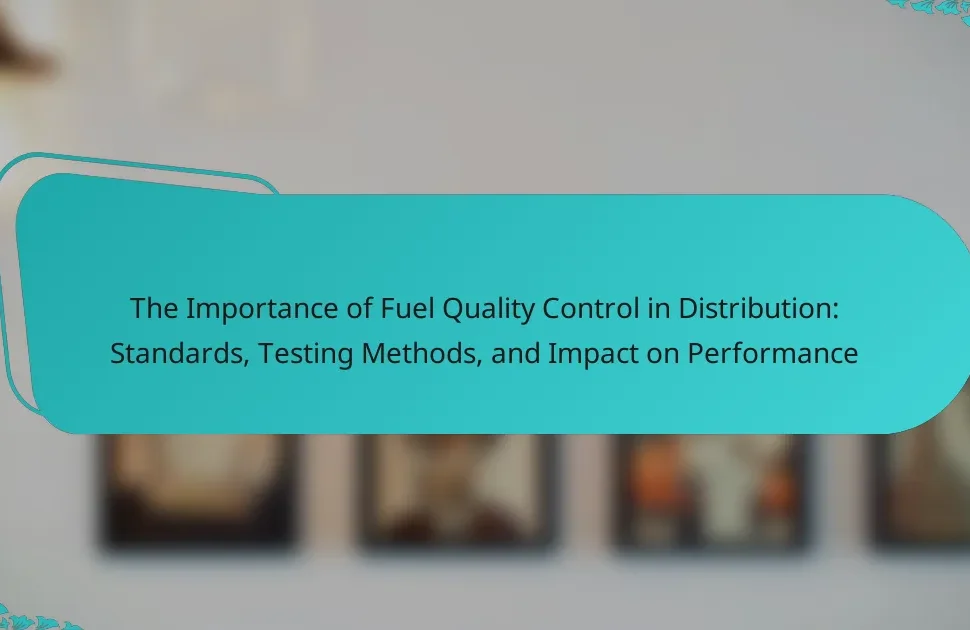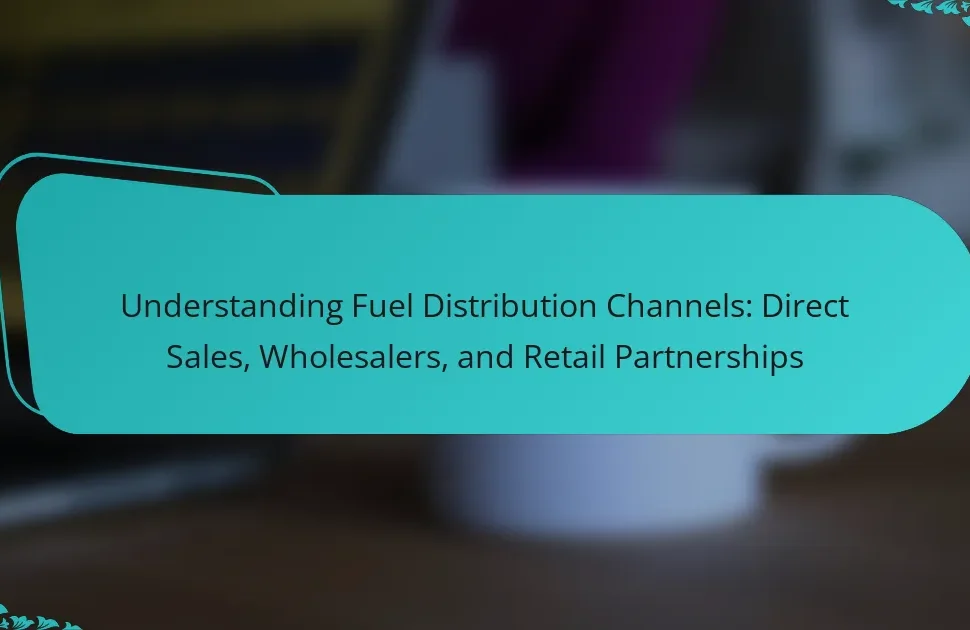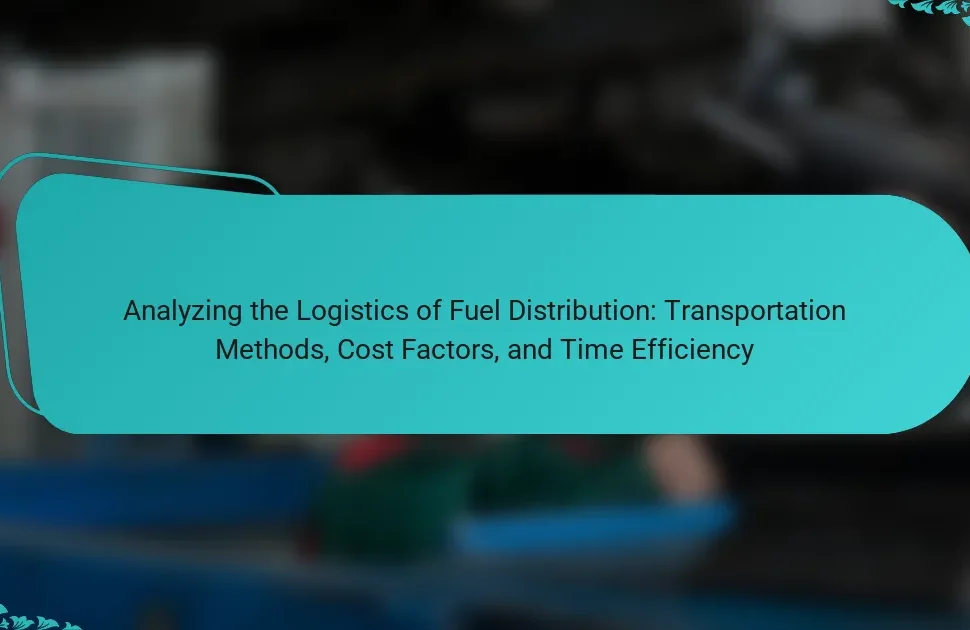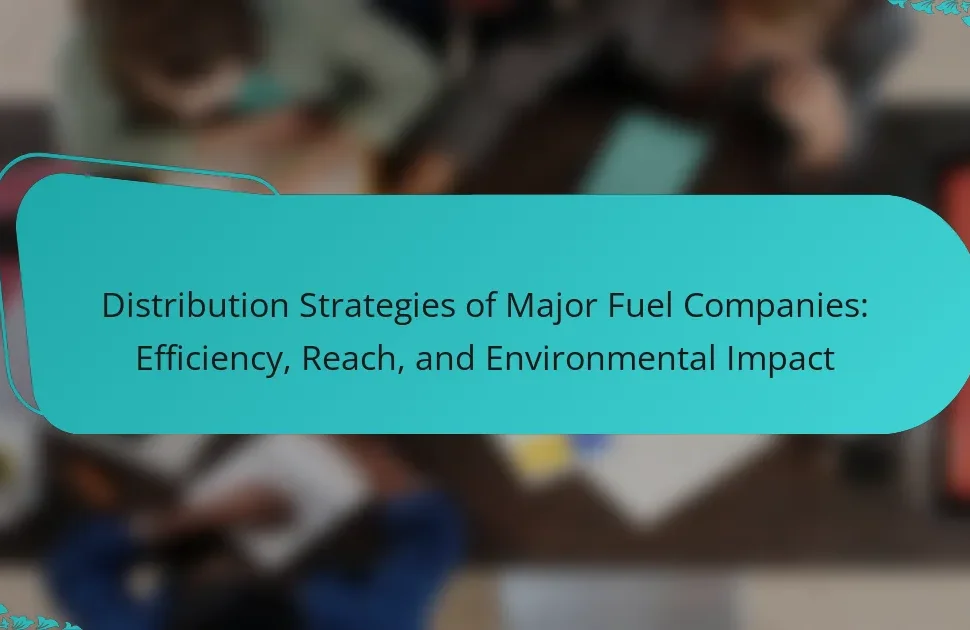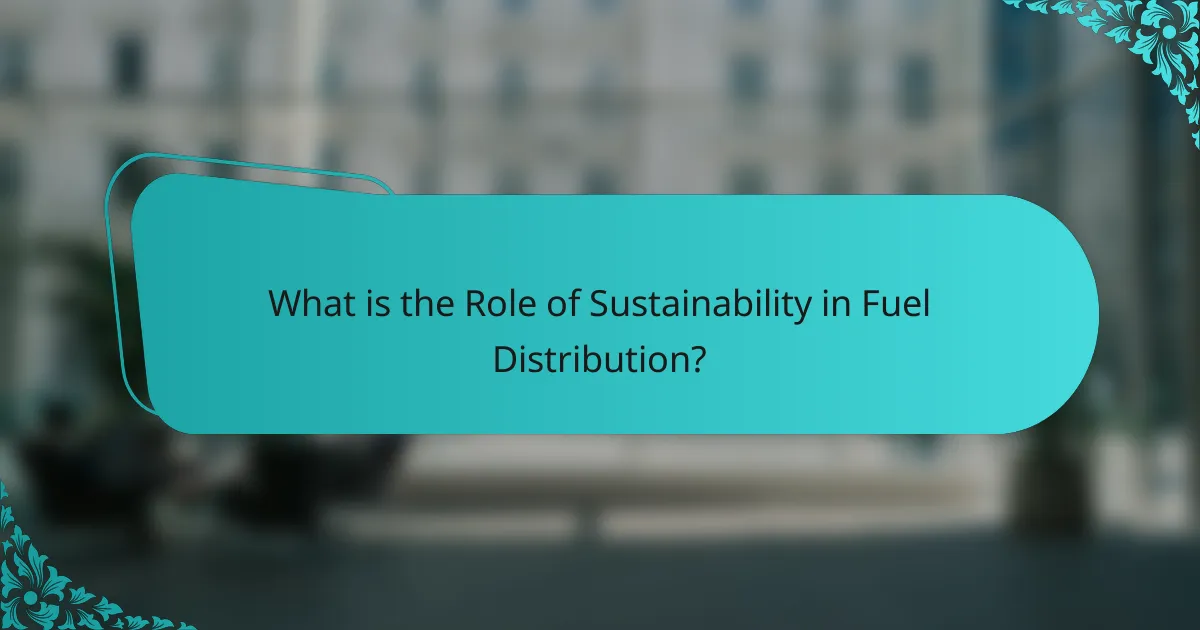
What is the Role of Sustainability in Fuel Distribution?
Sustainability in fuel distribution focuses on reducing environmental impact. It involves adopting eco-friendly practices throughout the supply chain. These practices include optimizing logistics to minimize carbon emissions. Companies are increasingly investing in renewable energy sources. This shift supports corporate responsibility and meets consumer demand for greener options. Studies show that sustainable practices can enhance brand loyalty. For instance, a report by Nielsen indicates that 66% of global consumers are willing to pay more for sustainable brands. Thus, sustainability plays a crucial role in shaping the future of fuel distribution.
How does sustainability impact fuel distribution practices?
Sustainability significantly impacts fuel distribution practices by promoting eco-friendly methods and reducing environmental footprints. Companies are increasingly adopting renewable energy sources, such as biofuels and solar power, to minimize greenhouse gas emissions. This shift not only aligns with regulatory standards but also meets consumer demand for greener alternatives. Additionally, sustainable practices enhance corporate responsibility, leading to improved brand loyalty among environmentally conscious customers. For instance, a report by the International Energy Agency states that transitioning to sustainable fuels can reduce carbon emissions by up to 80%. Overall, sustainability drives innovation in fuel distribution, encouraging efficiency and accountability in the industry.
What are the key eco-friendly practices in fuel distribution?
Key eco-friendly practices in fuel distribution include using alternative fuels and optimizing logistics. Alternative fuels reduce greenhouse gas emissions. Biodiesel and ethanol are common examples. Optimizing logistics involves efficient routing and reducing transportation distances. This minimizes fuel consumption and emissions. Implementing renewable energy sources at distribution facilities also contributes to sustainability. Solar panels can power operations, reducing reliance on fossil fuels. Regular maintenance of vehicles ensures they operate efficiently. This practice decreases emissions and fuel waste. Additionally, adopting advanced technology for monitoring fuel spills enhances environmental protection. These practices collectively promote sustainability in the fuel distribution industry.
How do these practices contribute to environmental conservation?
Eco-friendly practices in fuel distribution contribute to environmental conservation by reducing carbon emissions. These practices include using renewable energy sources and optimizing logistics. For example, adopting biodiesel reduces reliance on fossil fuels. Implementing energy-efficient transportation lowers greenhouse gas emissions. Additionally, utilizing technology for route optimization minimizes fuel consumption. According to the U.S. Environmental Protection Agency, improved efficiency can cut emissions by up to 30%. These measures help protect ecosystems and promote sustainable resource use.
Why is corporate responsibility important in fuel distribution?
Corporate responsibility is important in fuel distribution because it ensures ethical practices and sustainability. Fuel distribution companies impact the environment and communities significantly. Responsible companies minimize negative effects through eco-friendly practices. They often adopt renewable energy sources and reduce emissions. Additionally, corporate responsibility fosters trust with consumers. Companies that prioritize transparency and ethics can enhance their brand reputation. Research shows that 70% of consumers prefer brands committed to social responsibility. This preference drives sales and customer loyalty in the fuel sector. Thus, corporate responsibility is essential for long-term success and sustainability in fuel distribution.
What are the ethical obligations of fuel distribution companies?
Fuel distribution companies have several ethical obligations. They must ensure the safe and responsible transportation of fuel. This includes adhering to regulations that prevent spills and accidents. Companies should also prioritize environmental sustainability. This involves reducing carbon emissions and promoting cleaner energy sources. Transparency in pricing and business practices is another obligation. Consumers deserve clear information about costs and sourcing. Additionally, fuel distributors should engage in fair labor practices. This includes providing safe working conditions for employees. By fulfilling these obligations, companies can contribute positively to society and the environment.
How can companies demonstrate corporate responsibility in their operations?
Companies can demonstrate corporate responsibility by implementing sustainable practices in their operations. This includes reducing carbon emissions through energy-efficient technologies. For example, the use of renewable energy sources can significantly lower a company’s carbon footprint. Additionally, companies can adopt waste reduction strategies, such as recycling and reusing materials.
Transparency in supply chain practices also showcases corporate responsibility. This involves ensuring ethical sourcing of materials and fair labor practices. Engaging with local communities through outreach programs further enhances a company’s commitment to responsibility.
According to a 2020 study by Nielsen, 73% of consumers are willing to change their consumption habits to reduce environmental impact. This statistic highlights the growing importance of corporate responsibility in meeting consumer demand.
What influences consumer demand for sustainable fuel distribution?
Consumer demand for sustainable fuel distribution is influenced by several key factors. Awareness of environmental issues drives consumers to seek eco-friendly options. Government regulations and incentives also encourage the adoption of sustainable fuels. Economic factors, such as the price of sustainable fuels compared to traditional fuels, play a significant role. Additionally, corporate responsibility and brand reputation can affect consumer preferences. Studies show that consumers are more likely to choose brands that prioritize sustainability. Overall, these influences create a complex landscape for sustainable fuel distribution.
How do consumer preferences shape the market for eco-friendly fuels?
Consumer preferences significantly influence the market for eco-friendly fuels. As awareness of environmental issues rises, consumers increasingly demand sustainable energy options. This shift prompts fuel companies to invest in cleaner technologies. For instance, a 2021 survey indicated that 70% of consumers prefer brands with eco-friendly practices. Companies responding to this preference often see increased sales and brand loyalty. Furthermore, government incentives for green fuels align with consumer demand, further shaping the market. As a result, eco-friendly fuel options become more widely available and competitive. This trend indicates a clear correlation between consumer choices and market dynamics in the fuel industry.
What role does awareness play in consumer choices regarding fuel distribution?
Awareness significantly influences consumer choices regarding fuel distribution. Increased awareness leads consumers to prioritize eco-friendly options. Studies show that informed consumers are more likely to choose sustainable fuels. For instance, research by the International Council on Clean Transportation indicates that awareness of environmental impacts boosts demand for renewable fuels. Consumers often seek out brands that demonstrate corporate responsibility. Awareness of a company’s sustainable practices can enhance brand loyalty. In essence, awareness shapes preferences and drives market trends in fuel distribution.
How do eco-friendly practices align with corporate responsibility?
Eco-friendly practices align with corporate responsibility by promoting environmental stewardship and ethical operations. Corporations that adopt sustainable methods reduce their ecological footprint. This includes minimizing waste, conserving energy, and using renewable resources. Such practices enhance a company’s reputation and foster consumer trust. Research shows that 66% of consumers are willing to pay more for sustainable brands. Companies engaging in eco-friendly initiatives often see increased customer loyalty and market share. Furthermore, regulatory compliance and risk management are improved through sustainable practices. This alignment ultimately leads to long-term profitability and societal benefits.
What are the challenges in implementing sustainable practices in fuel distribution?
Implementing sustainable practices in fuel distribution faces several challenges. One major challenge is the high initial cost of transitioning to eco-friendly technologies. Many companies are deterred by the significant investment required for infrastructure changes. Regulatory compliance also poses difficulties, as varying regulations across regions complicate standardization efforts. Additionally, there is often resistance from stakeholders accustomed to traditional practices. Supply chain complexities can hinder the adoption of sustainable materials and methods. Limited availability of renewable fuel sources further restricts options for sustainable distribution. Lastly, consumer demand for sustainability may not always align with market readiness, creating a gap in implementation.
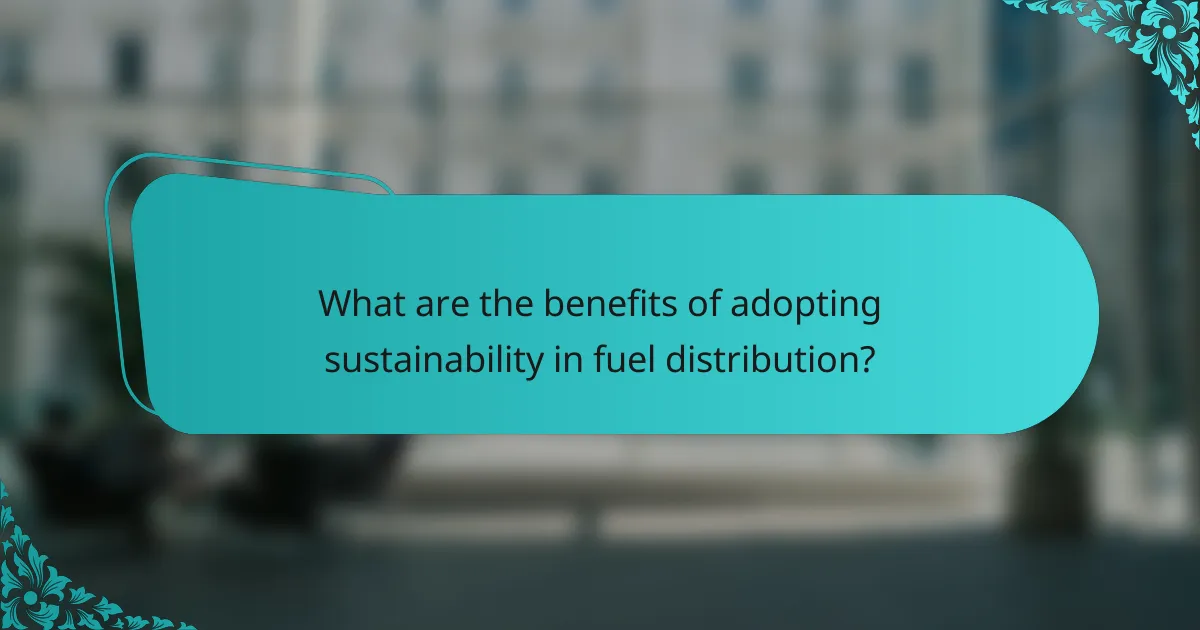
What are the benefits of adopting sustainability in fuel distribution?
Adopting sustainability in fuel distribution reduces environmental impact and enhances corporate reputation. Sustainable practices lower greenhouse gas emissions, contributing to climate change mitigation. For instance, using biofuels can decrease carbon emissions by up to 80% compared to traditional fossil fuels. Additionally, sustainable fuel distribution can lead to cost savings through improved efficiency and waste reduction. Companies implementing these practices often see increased customer loyalty as consumers favor environmentally responsible brands. Furthermore, regulatory compliance becomes easier, reducing legal risks associated with environmental violations. Overall, sustainability in fuel distribution promotes a healthier planet and supports long-term business viability.
How does sustainability improve operational efficiency?
Sustainability improves operational efficiency by reducing waste and optimizing resource use. Implementing sustainable practices can lead to lower energy consumption. For example, companies that adopt energy-efficient technologies reduce their operational costs significantly. Studies show that organizations can save up to 30% on energy bills through sustainability initiatives. Additionally, sustainable supply chain practices minimize excess inventory, which reduces storage costs. Efficient logistics also decrease transportation emissions and costs. Overall, sustainability fosters a culture of continuous improvement, enhancing productivity and efficiency across operations.
What cost savings can companies achieve through eco-friendly practices?
Companies can achieve significant cost savings through eco-friendly practices. Implementing energy-efficient technologies reduces utility bills. For example, switching to LED lighting can lower energy costs by up to 75%. Waste reduction practices minimize disposal fees. Recycling can save businesses around $30 per ton compared to landfill costs. Sustainable sourcing often leads to lower material costs in the long run. Companies that adopt green supply chain practices report savings of 10-20% on logistics. Additionally, eco-friendly practices can enhance brand reputation, potentially increasing sales and customer loyalty. Overall, these savings can contribute to a healthier bottom line.
How does sustainability enhance brand reputation in the fuel industry?
Sustainability enhances brand reputation in the fuel industry by building consumer trust and loyalty. Companies that adopt eco-friendly practices demonstrate commitment to environmental responsibility. This commitment can lead to positive public perception and increased brand equity. A study by Nielsen found that 66% of global consumers are willing to pay more for sustainable brands. Additionally, sustainability initiatives can differentiate a brand from its competitors. Brands that prioritize sustainability often attract environmentally conscious consumers. This alignment with consumer values fosters long-term relationships. Ultimately, a strong reputation for sustainability can lead to increased market share and profitability.
What are the long-term impacts of sustainable fuel distribution on the environment?
Sustainable fuel distribution has significant long-term impacts on the environment. It reduces greenhouse gas emissions by promoting cleaner energy sources. For instance, biofuels can lower carbon dioxide emissions by up to 80% compared to fossil fuels. Sustainable practices also minimize air pollution, leading to improved public health outcomes. Furthermore, these practices encourage the conservation of natural resources, reducing the depletion of fossil fuel reserves. By investing in renewable energy infrastructure, sustainable fuel distribution supports biodiversity and ecosystem health. Studies show that transitioning to sustainable fuels can lead to a decrease in environmental degradation over time. Overall, the long-term environmental benefits of sustainable fuel distribution are substantial and vital for combating climate change.
How does sustainable fuel distribution contribute to reducing carbon emissions?
Sustainable fuel distribution reduces carbon emissions by optimizing the supply chain and promoting cleaner energy sources. It minimizes transportation distances, which lowers greenhouse gas emissions from fuel transport. Sustainable practices include using biofuels and renewable energy, which have lower carbon footprints than fossil fuels. According to the International Energy Agency, biofuels can reduce lifecycle greenhouse gas emissions by up to 80% compared to traditional fuels. Additionally, efficient logistics and distribution systems decrease fuel consumption during delivery. This holistic approach to fuel distribution aligns with global sustainability goals, contributing to a significant reduction in carbon emissions.
What are the potential benefits for consumers in sustainable fuel distribution?
Sustainable fuel distribution offers consumers several benefits. It reduces greenhouse gas emissions, contributing to a healthier environment. This can lead to improved air quality, which benefits public health. Additionally, sustainable fuels often come from renewable sources. This reduces dependence on fossil fuels, enhancing energy security. Consumers may also save money in the long run due to lower fuel costs. Sustainable fuels can be more efficient, leading to better vehicle performance. Moreover, many consumers prefer brands that demonstrate environmental responsibility. This preference can influence purchasing decisions and brand loyalty.
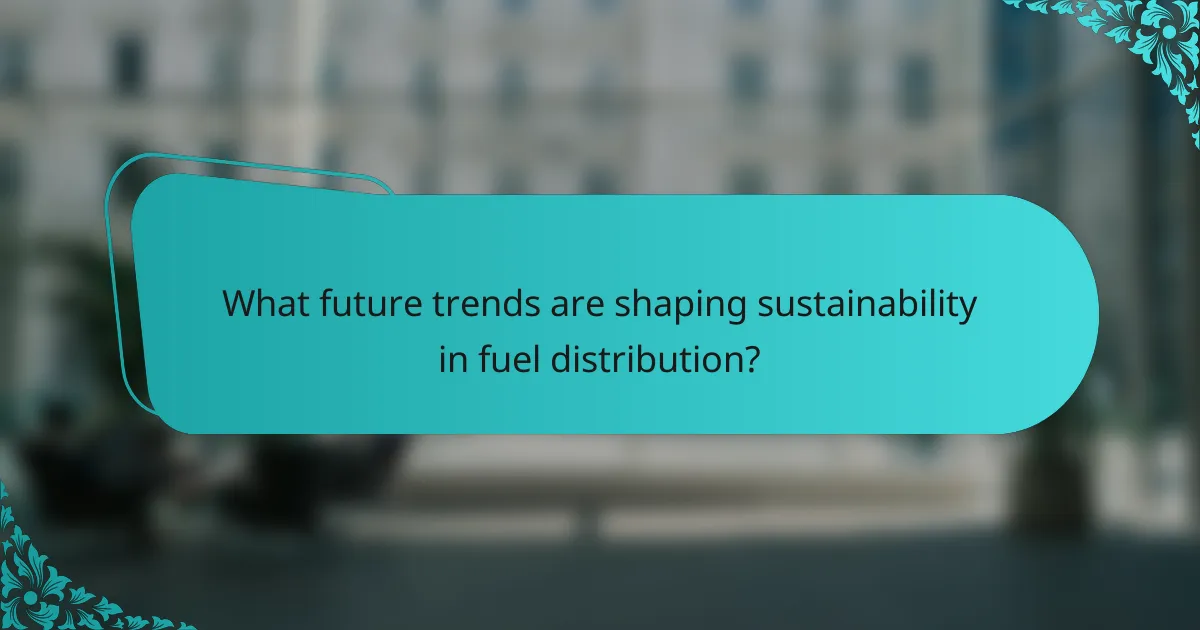
What future trends are shaping sustainability in fuel distribution?
Future trends shaping sustainability in fuel distribution include the adoption of renewable energy sources, electric vehicle (EV) infrastructure development, and enhanced supply chain transparency. Renewable energy sources, such as biofuels and hydrogen, are increasingly integrated into fuel distribution networks. This shift reduces reliance on fossil fuels and lowers greenhouse gas emissions.
The development of EV infrastructure is also critical. As electric vehicles become more popular, fuel distributors are investing in charging stations. This trend supports the transition to cleaner transportation options. Enhanced supply chain transparency is another emerging trend. Companies are using technology to track the sustainability of their fuel sources. This practice informs consumers about the environmental impact of their fuel choices.
According to a report by the International Energy Agency, the global biofuel production is expected to reach 150 billion liters by 2025. This statistic highlights the growing significance of renewable energy in fuel distribution. Additionally, a survey by Deloitte found that 70% of consumers prefer brands that demonstrate environmental responsibility. This demand drives companies to adopt sustainable practices in fuel distribution.
How is technology driving sustainability in fuel distribution?
Technology is driving sustainability in fuel distribution through innovations that enhance efficiency and reduce environmental impact. Advanced data analytics optimize supply chain logistics, minimizing waste and energy consumption. Smart sensors monitor fuel levels in real-time, preventing overstock and reducing emissions from transportation. Blockchain technology ensures transparency and traceability in fuel sourcing, promoting responsible practices. Electric and hybrid vehicles are increasingly used for distribution, lowering carbon footprints. Renewable energy sources power distribution centers, further decreasing reliance on fossil fuels. According to the International Energy Agency, these technologies can reduce greenhouse gas emissions in the sector by up to 30% by 2030.
What innovations are emerging in eco-friendly fuel technologies?
Emerging innovations in eco-friendly fuel technologies include advancements in biofuels, hydrogen fuel cells, and electric vehicle (EV) technology. Biofuels are now being produced from waste materials, reducing environmental impact. Hydrogen fuel cells provide a clean energy source, emitting only water vapor. Electric vehicle technology has seen improvements in battery efficiency and charging infrastructure. These innovations aim to decrease reliance on fossil fuels. According to the International Energy Agency, global biofuel production reached 160 billion liters in 2020, highlighting its growing significance. Additionally, the deployment of hydrogen fuel cell vehicles is projected to increase significantly by 2030.
How can digital solutions enhance sustainability in the fuel supply chain?
Digital solutions can enhance sustainability in the fuel supply chain by optimizing operations and reducing waste. Advanced data analytics can improve demand forecasting, minimizing excess inventory. This leads to lower emissions from storage and transportation. Internet of Things (IoT) devices can monitor fuel levels in real-time, preventing overfilling and spills. Blockchain technology can ensure transparency and traceability in sourcing, promoting ethical practices. Automated logistics can streamline delivery routes, reducing fuel consumption. According to a study by McKinsey, digital tools can cut supply chain costs by 20-30%. Implementing these technologies fosters a more sustainable fuel supply chain.
What regulatory changes are impacting sustainable fuel distribution?
Regulatory changes impacting sustainable fuel distribution include stricter emissions standards and incentives for renewable energy adoption. Governments are implementing regulations that require lower carbon emissions from fuel sources. For instance, the Renewable Fuel Standard (RFS) in the U.S. mandates increasing volumes of renewable fuels. Additionally, the European Union’s Fit for 55 package aims to reduce greenhouse gas emissions by at least 55% by 2030. These regulations are driving investments in sustainable fuel technologies. They also encourage companies to transition from fossil fuels to biofuels and other renewable options. Compliance with these regulations is becoming essential for fuel distributors to remain competitive.
How do government policies influence corporate sustainability efforts?
Government policies significantly influence corporate sustainability efforts by establishing regulations and incentives. These policies can mandate environmental standards that companies must meet. For example, emissions regulations force companies to adopt cleaner technologies. Incentives such as tax breaks for sustainable practices encourage businesses to invest in renewable energy. Additionally, government funding for sustainability initiatives can support research and development. Policies also shape consumer expectations, prompting companies to enhance their sustainability strategies. A study by the World Resources Institute shows that firms operating in regions with strict environmental policies tend to have better sustainability performance. Therefore, government actions play a crucial role in driving corporate sustainability.
What role do international agreements play in shaping fuel distribution practices?
International agreements play a critical role in shaping fuel distribution practices. They establish regulations and standards that countries must follow. These agreements often aim to reduce greenhouse gas emissions and promote sustainable energy use. For example, the Paris Agreement encourages nations to commit to lowering their carbon footprints. Compliance with such agreements influences national policies on fuel distribution. Countries may adopt cleaner technologies and practices to meet international obligations. This shift can lead to improved environmental outcomes and more efficient fuel distribution systems. The impact of these agreements is evident in global efforts to transition towards renewable energy sources.
What practical steps can consumers take to support sustainable fuel distribution?
Consumers can support sustainable fuel distribution by choosing renewable energy sources. This includes opting for biofuels or electricity from renewable sources for their vehicles. Consumers can also reduce fuel consumption by using public transportation, biking, or walking. Carpooling with others decreases the number of vehicles on the road, which lowers emissions. Additionally, consumers should consider purchasing energy-efficient vehicles that require less fuel. Supporting companies that prioritize sustainable practices can drive demand for greener options. Educating themselves and others about the benefits of sustainable fuels can further encourage change. According to the International Energy Agency, adopting these practices significantly reduces carbon footprints.
The main entity of the article is sustainability in fuel distribution. The article explores the critical role of eco-friendly practices in reducing environmental impact, enhancing corporate responsibility, and meeting consumer demand for greener options. It outlines key sustainable practices, their effects on operational efficiency, and the importance of corporate responsibility in building brand loyalty. Additionally, it examines how consumer preferences and regulatory changes influence the market dynamics of sustainable fuel distribution. The article also highlights future trends and technological innovations driving sustainability in the industry.
